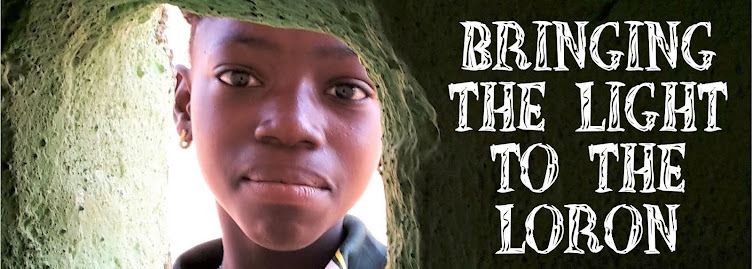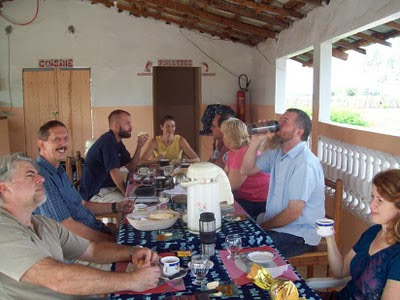What an eventful trip! What started out as a regular 6-monthly, 3-day gathering of NTM’s West Africa leaders in Guinea Conakry ended up taking two full weeks of our time, culminating in a rather tense exit from the country’s capital as widespread political violence swept the city.
On our way to Guinea earlier in the month, Marina and I were held up for several days in Bamako after our flight to Conakry had been cancelled at the last minute. The final round of polling in the presidential election in Guinea was rescheduled to take place on the very day we were supposed to arrive and the authorities belatedly announced that they were closing the airport, so we had to quickly make new plans. We eventually got to Guinea three days late.
We enjoyed meeting the missionaries who work at the MK school and NTM centre and also some of the new NTM folks in Africa who are learning French and African culture. After our committee meetings finished we travelled to a village to visit the missionaries who live among the Baga Fore people. Marina had spent a week with these folks earlier this year, helping them get their literacy programme off the ground. She had really enjoyed her time with the missionaries and wanted to visit them to see how the teaching was progressing. It was a thrill to hear that the first class had completed the course just before our arrival. We had a great time with the two families and single lady as we discussed their plans for Bible translation and starting Bible teaching in the local language. The next day we left their village to return to the Guinean capital, Conakry, for our flight back to Burkina.
The four-hour trip to the capital was rather uneventful, although some of the views, especially the mountains along the road, were quite outstanding. The ‘highlight’ of the journey was when, at a security checkpoint, we were brusquely ordered out of our taxi by a young, over-zealous soldier and told to open our suitcases. I’m not sure what he was looking for, but after a thorough inspection, and satisfied that we had no contraband, we were allowed to continue on our way. For Marina and me, it was no big deal, but our taxi driver was very angry at the way we had been treated.
We wanted to avoid the street demonstrations that been taking place in various parts of the capital since the election had taken place, so we arrived at the airport about 5 hours before our flight was scheduled to leave. We found a couple of seats in the corner of a large, rather dull waiting room on the ground floor and settled ourselves for a long wait.
After about two hours a police officer came over to us and told us that our flight had been cancelled. We were incredulous and wondered what we were going to do. Due to the political tensions in the country we have no missionaries living in Conakry, and we didn’t know where we could go to spend night, so we contacted Idrissa, a Guinean man who helps our missionaries with business in the city. He said that he would come to the airport to get us and help us to find somewhere to stay. We eventually got a room at an Assemblies of God mission station. The French couple in charge of the guesthouse were extremely friendly and helpful. We had a comfortable night, despite several power outages during the night when the fans stopped turning and it got quite warm and sticky.
At 7am the next morning, Idrissa went to the Air Mali office to rearrange our flights. He was first in line and was able to get us seats on a flight apparently going out that afternoon. However, events were taking a nasty turn in the city. Counting of votes from the November 7th poll had been going on for eight days and activists from one of the parties claimed that massive fraud was taking place. They were becoming increasingly angry and frustrated. Just before noon they started to block roads and burn tyres. We were supposed to leave for the airport at 2pm.
The French missionaries at the guesthouse had invited us to their home for lunch. As we sat chatting, we heard a burst of automatic gunfire and then sporadic gunfire echo around the city. Things were getting serious. The French embassy contacted its citizens and told them to remain where they were, including children at a French school.
We phoned Idrissa to try to find out what was happening and he assured us that despite the violence – two people had reportedly been shot dead and many wounded - he would still be able to get us to the airport by avoiding the trouble spots. We assured our French hosts that we would be fine and said that we from Northern Ireland and had some experience with this sort of thing. Nevertheless, we were beginning to wonder if, indeed, we were going to be able to get our flight out of the country.
Idrissa turned up for us a few minutes earlier than planned. We quickly loaded our bags and started our journey through the city to the airport located on the southern end of the Conakry peninsula. The roads, which had been bustling with people and traffic the previous day, were eerily deserted, apart from a few desperate taxi drivers looking for a fare. Idrissa raced along roads and through districts that he knew to be calm, avoiding areas of the city that had seen the worst of the violence. At one junction he showed us a spot where, earlier in the day when he had been going to get our tickets changed, he had seen a man being severely beaten. The whole thing seemed rather surreal.
Thankfully, we soon arrived, without incident, at the airport. We were first in line. Slowly others trickled in from various parts of the city. It was not long until we were all sitting in a beautiful new elevated departure lounge looking out on blue skies and an empty runway. The peace and calm of the air conditioned lounge was in sharp contrast to the heated tempers and high humidity of the rest of the city. We were still not sure for certain that we were going to get out of the city, so it was a relief to see the 50-seater Air Mali Bombardier plane arrive at the airport. The check-in staff promptly set up their stall and the passengers were smoothly and efficiently processed, and we were soon belted in to our seats ready for take-off. Thirty minutes ahead of schedule, the high-pitched engines roared into life and the wheels speedily and gently lifted off the tarmac.
One hour and fifteen minutes later we touched down at Bamako airport in Mali, just in time to get checked in on a connecting flight back to Ouagadougou in Burkina Faso.
Meanwhile, back in Conakry, Idrissa was trying to make his way back home from the airport. Unfortunately, he got caught up in a mob and his car was slightly damaged as he tried to get away. He was able to get to a friend’s house where he parked his vehicle in the courtyard. He remained there until the trouble had passed, and was able to return home later in the evening.
Our connection flight from Bamako to Ouaga was delayed for several hours because they had to replace the plane we were supposed to take, but, eventually, just before 2am, we pulled up in a taxi at the SIM guesthouse in Ouagadougou.
We thank the Lord for His grace and protection. We would ask you to continue to pray for the country of Guinea, and also for the missionaries who live there as they endeavour to bring the light of the Gospel to the unreached people groups in that country.















































